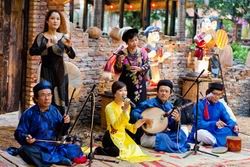Ceremony to honor “Don ca tai tu”
VGP – The Ministry of Culture, Sports and Tourism will host a ceremony on February 22, 2014 to receive a Certificate from the UNESCO to recognize “Don ca tai tu” as Intangible Cultural Heritage of Humanity.
 |
|
Illustration photo |
“Don ca tai tu,” considered one of the country’s main chamber music genres, originated from Hue court music and folk music of the southern region.
The genre has been developing since the 19th century, changing with local taste. It thrived in the early 20th century and remains crucial to the country’s traditional culture.
“Don ca tai tu” is typically performed at festivals, death anniversary rituals, and celebrations by farmer-artists.
Instrumentalists and singers express their feelings by improvising and ornamenting based on 20 principal songs and 72 classical songs. The art has been handed down orally through generations.
By Thuy Dung

